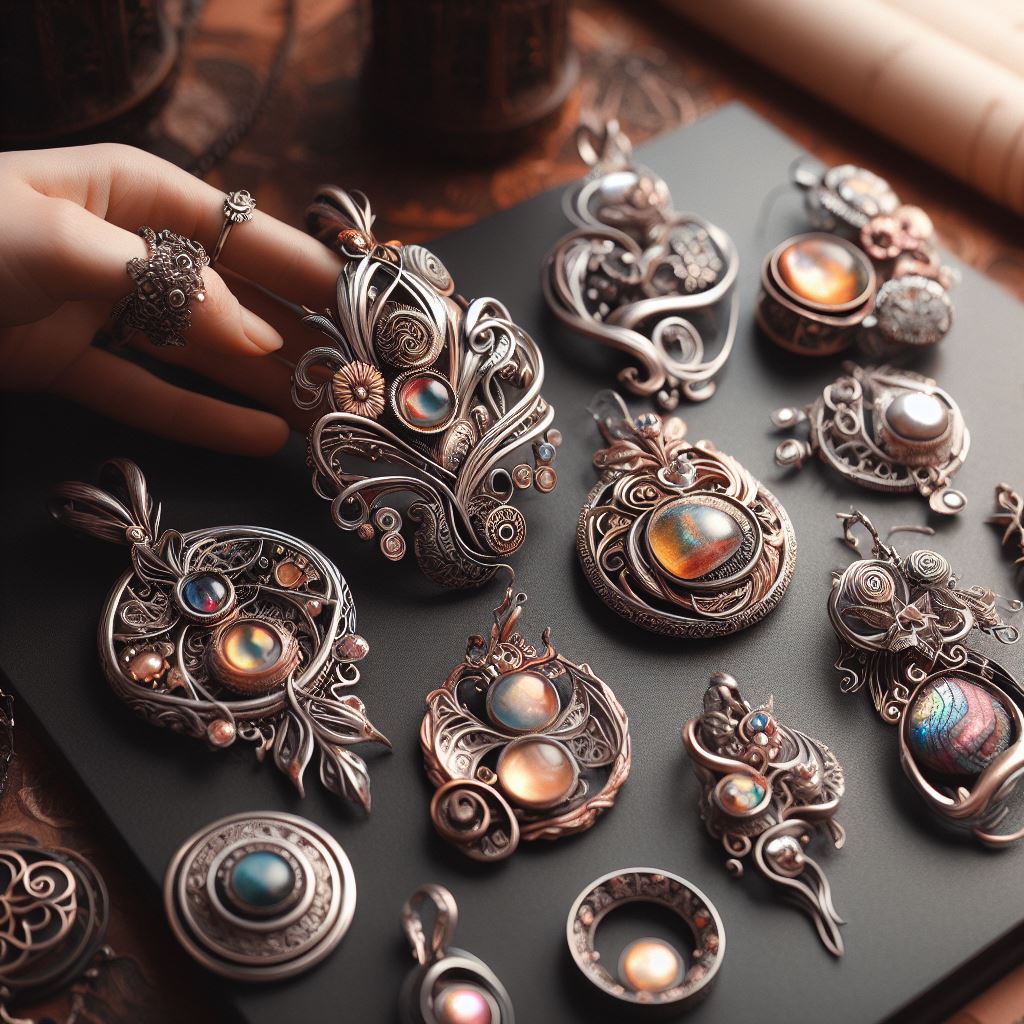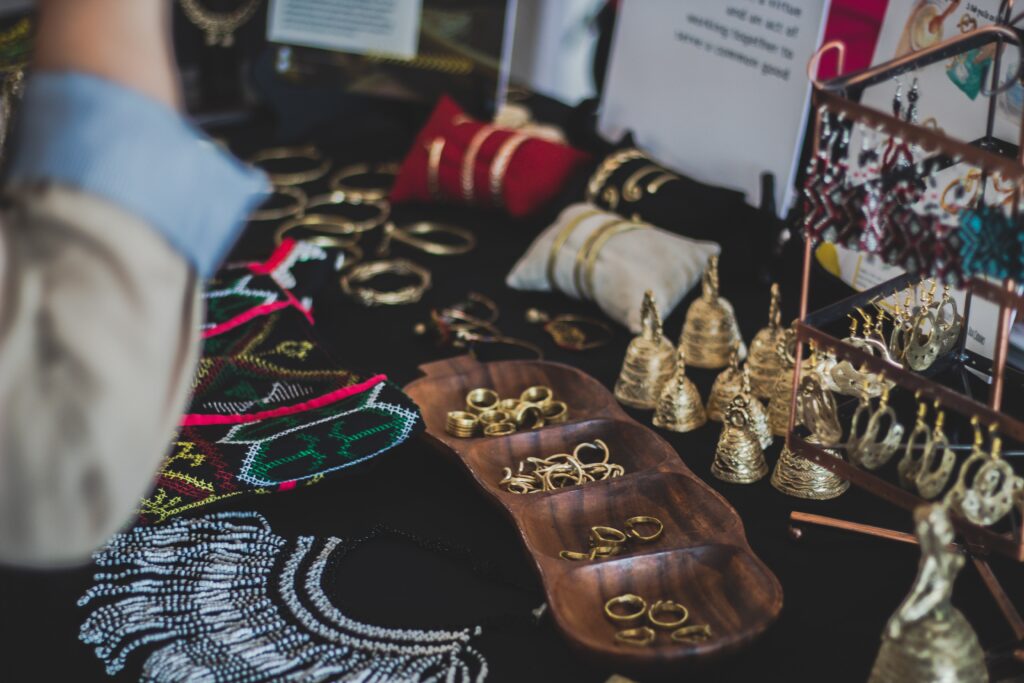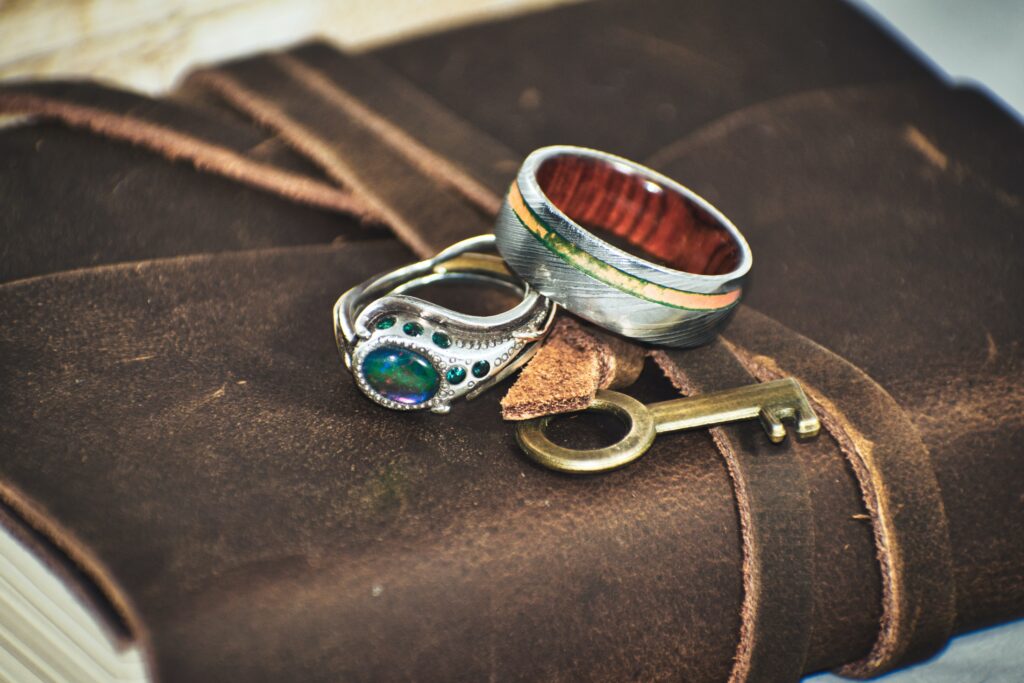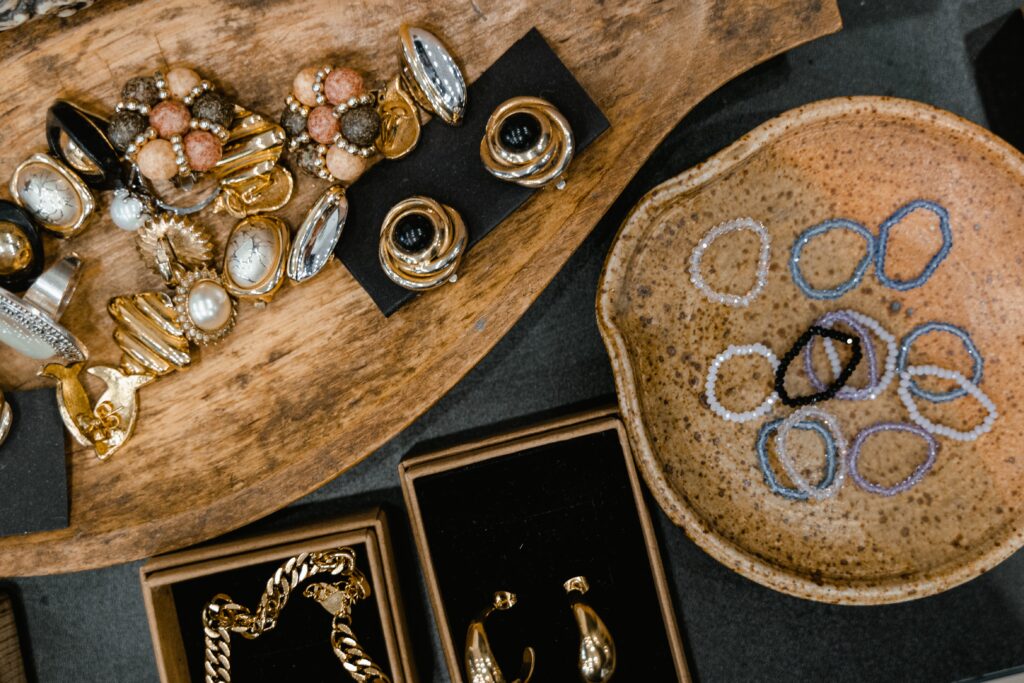
Are you someone who loves jewelry and appreciates the craftsmanship that goes into handmade pieces? If so, you may have wondered about the ethical considerations surrounding the purchase of handmade jewelry. While it is easy to get lost in the beauty and uniqueness of these pieces, it is important to question the origins of the materials used and the working conditions of the artisans. In this article, we will explore the various ethical aspects that come into play when buying handmade jewelry, allowing you to make informed choices and support ethical practices in the industry. So, let’s dive into the world of handmade jewelry and uncover the ethical considerations that lie beneath its surface.

Check out our TOP three Recommended products
1. Material Sourcing
When it comes to buying handmade jewelry, one of the key factors to consider is the material sourcing. This involves examining the origins of the materials used in the creation of the jewelry, and whether there are any ethical concerns associated with them.
1.1. Use of Conflict Minerals
Conflict minerals refer to minerals that are mined in areas of armed conflict and are sold to finance those conflicts. These minerals include gold, tin, tungsten, and tantalum. When purchasing handmade jewelry, it is important to ensure that these conflict minerals are not being used in the production process. By opting for jewelry that uses ethically sourced materials, you can be confident that your purchase is not contributing to violence and exploitation.
1.2. Environmental Impact of Mining
Mining can have significant environmental consequences, such as deforestation, habitat destruction, and pollution of water sources. When choosing handmade jewelry, consider whether the materials used have been mined in a sustainable and environmentally responsible manner. Look for artisans who prioritize environmentally friendly practices and use materials that are sourced with minimal impact on the environment.
1.3. Fair Trade and Responsible Sourcing
Fair trade ensures that artisans and workers involved in the production of jewelry are paid fair wages and are provided with safe working conditions. When buying handmade jewelry, look for products that have been certified as fair trade. This ensures that the artisans who create the jewelry are being treated fairly and are not subjected to exploitative labor practices. Responsible sourcing goes beyond fair trade certification and involves tracing the entire supply chain to ensure ethical practices at every stage of production. By supporting artisans who prioritize fair trade and responsible sourcing, you can make a positive impact on their lives and support sustainable livelihoods.
2. Working Conditions
The working conditions of the artisans and workers involved in the production of handmade jewelry should be an important consideration when making a purchase. Ensuring that the people behind the products are treated fairly and have access to basic rights is crucial in supporting ethical practices.
2.1. Exploitative Labor Practices
Exploitative labor practices, such as long working hours, unsafe working conditions, and lack of proper compensation, are unfortunately prevalent in various industries, including jewelry production. By choosing handmade jewelry from artisans who prioritize fair labor practices, you can help combat these exploitative practices and support a more ethical industry.
2.2. Child Labor
Child labor is a serious concern in many parts of the world, and the jewelry industry is not exempt from this issue. When purchasing handmade jewelry, it is important to ensure that child labor is not involved in any stage of the production process. Supporting artisans who have strict policies against child labor helps promote child rights and ensures the well-being of children in vulnerable communities.
2.3. Fair Wages and Worker Rights
Fair wages and worker rights are fundamental aspects of ethical jewelry production. Artisans and workers should receive fair compensation for their skills and labor. When buying handmade jewelry, look for artisans who prioritize fair wages and worker rights, such as providing safe working conditions, promoting gender equality, and respecting the rights of workers to form unions and engage in collective bargaining.
Check out our TOP three Recommended products
3. Artisan Empowerment
Choosing handmade jewelry is not only about owning a unique piece but also supporting local artisans and preserving traditional craftsmanship. By investing in handmade jewelry, you contribute to the economic empowerment of artisans and help sustain their communities.
3.1. Supporting Local Artisans
Supporting local artisans means investing in their skills, creativity, and cultural traditions. When purchasing handmade jewelry, seek out artisans who are part of local communities and are committed to preserving traditional craftsmanship. By supporting these artisans, you help create opportunities for them to showcase their talent and create sustainable livelihoods.
3.2. Preserving Traditional Craftsmanship
Handmade jewelry often incorporates traditional crafting techniques that have been passed down through generations. By choosing handmade jewelry, you support the preservation of these cultural practices, ensuring that they are not lost to modernization. Additionally, purchasing from artisans who prioritize preserving traditional craftsmanship helps maintain cultural diversity and promotes the appreciation of different artistic traditions.
3.3. Economic Impact on Artisan Communities
The purchase of handmade jewelry has the potential to make a significant economic impact on artisan communities. By buying directly from artisans or supporting brands that work closely with them, you contribute to their financial stability and overall socioeconomic development. This, in turn, can lead to improved access to education, healthcare, and other basic necessities for artisan communities.
4. Transparency and Accountability
Transparency and accountability are important aspects of ethical handmade jewelry production. Having a clear understanding of the supply chain, certifications, and the impact of your purchase allows you to make an informed and conscious decision.
4.1. Supply Chain Transparency
Understanding the supply chain of the handmade jewelry you purchase is crucial in ensuring ethical practices. Look for artisans or brands that provide transparency about where their materials come from, how they are sourced, and who is involved in the production process. Transparent supply chains allow you to trace the origin of the materials and ensure that all stakeholders are treated ethically.
4.2. Certification and Verification
Certifications and verification processes can provide reassurance that the handmade jewelry meets certain ethical standards. Look for certifications such as Fairtrade, Responsible Jewellery Council (RJC), or artisan-specific certifications that guarantee fair labor practices, responsible sourcing, and environmentally friendly production methods. These certifications demonstrate a commitment to ethical practices and provide an additional layer of confidence in your purchase.
4.3. Consumer Education and Awareness
As a conscious consumer, educating yourself about ethical handmade jewelry practices is essential. Stay informed about the issues surrounding the jewelry industry, such as exploitative labor practices or the use of unsustainable materials. By being aware of the challenges and supporting ethical practices, you can play a part in improving the overall sustainability and ethics of the industry.

5. Environmental Impact
Choosing handmade jewelry offers an opportunity to reduce environmental harm and support sustainable practices. By considering the environmental impact of materials and production processes, you can contribute to a more eco-friendly industry.
5.1. Use of Sustainable Materials
Sustainable materials are those that are sourced in a way that minimizes negative environmental impact. When buying handmade jewelry, look for artisans who prioritize the use of sustainable materials, such as recycled metals, responsibly sourced gemstones, or alternative materials that have a lower environmental footprint. By opting for jewelry made from sustainable materials, you help reduce the demand for environmentally harmful mining practices.
5.2. Waste Management
Waste management is another important consideration in the production of handmade jewelry. Look for artisans or brands that prioritize waste reduction, recycling, and upcycling. By supporting artisans who create jewelry from recycled materials or repurpose scraps into new designs, you contribute to the reduction of waste and promote circular economy practices.
5.3. Carbon Footprint Reduction
Reducing the carbon footprint of the jewelry industry is crucial in combating climate change. When choosing handmade jewelry, consider the carbon emissions associated with the production process and transportation. Opting for local artisans or brands that prioritize environmentally friendly practices, such as using renewable energy or offsetting their carbon emissions, can help reduce the overall environmental impact.
6. Cultural Appropriation
Cultural appropriation is a sensitive topic that revolves around the adoption of elements from a culture without proper understanding or respect. When buying handmade jewelry, it is important to consider whether the designs or inspirations used by the artisan respect the cultural heritage they are drawn from.
6.1. Respect for Indigenous Cultures
Choosing handmade jewelry that respects and honors the cultural heritage of indigenous communities is essential in avoiding cultural appropriation. Seek out artisans who work closely with indigenous communities, ensuring that their designs are created in collaboration with the people and communities who own the cultural knowledge being represented. By supporting these artisans, you contribute to the preservation and celebration of cultural diversity.
6.2. Appropriation vs. Appreciation
Understanding the difference between cultural appropriation and cultural appreciation is crucial. Cultural appreciation involves respectfully acknowledging and celebrating the cultural traditions and heritage behind the designs, while appropriation involves taking elements out of context or without proper permission. By purchasing handmade jewelry that appreciates and celebrates cultural diversity, you can avoid perpetuating harmful appropriation practices.
6.3. Ethical Concerns in Design and Inspiration
Artisans who prioritize ethical design and inspiration ensure that their creativity is not derived from appropriating cultural symbols or sacred designs. By supporting these artisans, you can encourage the development of unique and original designs that respect cultural heritage while promoting artistic innovation and expression.

7. Supporting Small Businesses
Choosing handmade jewelry allows you to support small businesses and independent artisans, promoting economic sustainability and fostering personal connections.
7.1. Economic Sustainability
Supporting small businesses and independent artisans contributes to economic sustainability. When you buy handmade jewelry, a larger percentage of the proceeds goes directly to the artisans or small-scale businesses, enabling them to thrive and continue their craft. By supporting these businesses, you become a part of their success story and help create a more diverse and resilient jewelry industry.
7.2. Avoiding Mass Production
Mass production often leads to exploitation of labor, environmental degradation, and a loss of craftsmanship. By purchasing handmade jewelry, you actively reject the mass production model and contribute to a more sustainable and ethical industry. Choosing jewelry that is made with care and attention to detail allows you to own a unique piece with a story behind it.
7.3. Building Personal Connections
One of the joys of purchasing handmade jewelry is the opportunity to build personal connections with the artisans. Whether it’s through purchasing directly from an artisan at a local market or supporting brands that prioritize engagement with artisans, you can develop a deeper appreciation for the craftsmanship and cultural significance of the jewelry you own. By establishing these connections, you become a valued supporter of their work and contribute to the growth of their businesses.
8. Consumer Awareness and Research
Being an ethical consumer involves conducting research and being aware of the practices of the artisans or brands you choose to support. By understanding the complexities of handmade jewelry production, you can make more informed choices aligned with your values.
8.1. Ethical Brand Evaluation
Evaluating the ethical practices of the brands you are considering is an important step in making an informed purchase decision. Look for brands that are transparent about their sourcing, production processes, and labor practices. Consider their commitments to ethical standards, certifications, and any initiatives they are involved in to support sustainability and social responsibility. By evaluating brands based on their ethical practices, you can support those that align with your values.
8.2. Researching Artisanal Practices
Researching the practices of artisans and learning about their stories can help you make ethical choices. Look for information about their backgrounds, training, and dedication to craftsmanship. Take the time to understand the cultural significance of their designs and the materials they use. By supporting artisans whose practices resonate with you, you can become a more conscientious consumer and appreciate the artistry behind the jewelry.
8.3. Ethical Consumer Guides and Resources
There are numerous resources available to help you navigate the world of ethical handmade jewelry. Ethical consumer guides, online platforms, and community websites provide information on brands, certifications, and initiatives that promote ethical practices. These resources can help you make informed choices aligned with your values and connect with like-minded individuals who share your commitment to ethical consumption.

9. Counterfeits and Imitations
Protecting authentic artisans and ensuring the quality and craftsmanship of handmade jewelry are important considerations. By avoiding counterfeits and imitations, you help sustain the integrity of the industry and support genuine artisans.
9.1. Protecting Authentic Artisans
Counterfeit products harm the livelihoods of authentic artisans by undermining their work and diluting the uniqueness of their designs. When purchasing handmade jewelry, be cautious of counterfeit products and imitations that mimic the work of genuine artisans. Supporting authentic artisans ensures that their talent, creativity, and cultural heritage are respected and valued.
9.2. Ensuring Quality and Craftsmanship
Handmade jewelry is often prized for its quality and craftsmanship. Counterfeit products and imitations may not uphold the same standards, compromising on quality, and potentially exploiting labor in the production process. By purchasing from trusted artisans or reputable brands, you can be confident in the quality and craftsmanship of the jewelry you own.
9.3. Reducing Counterfeit Market
By choosing to support genuine artisans and ethical brands, you contribute to the reduction of the counterfeit market. Counterfeit products often involve unethical practices, such as exploitation of labor, supporting criminal networks, or using low-quality materials. By opting for authentic handmade jewelry, you actively discourage the production and sale of counterfeit goods.
10. Personal Values and Preferences
Ultimately, the decision to purchase handmade jewelry should align with your personal values and preferences. Understanding your own ethics, considering the balance between price and ethics, and defining what sustainable fashion means to you can guide your purchasing choices.
10.1. Understanding Personal Ethics
Reflect on your own values and ethical principles. Consider what is most important to you when it comes to supporting ethical practices in the jewelry industry. It could be fair trade, environmental sustainability, cultural preservation, or a combination of various factors. Understanding your personal ethics helps you make choices aligned with your values and make a positive impact on the industry.
10.2. Balancing Price and Ethics
Balancing price and ethics can be a challenge when purchasing handmade jewelry. Ethical practices often come with a higher price tag due to the fair compensation of artisans, the use of sustainable materials, and the commitment to responsible sourcing. Consider how much you are willing to invest in supporting ethical practices while also ensuring that the jewelry you purchase is within your budget. Remember that handmade jewelry often offers unique and high-quality pieces that have inherent value beyond monetary considerations.
10.3. Defining Sustainable Fashion
Sustainable fashion encompasses various aspects, including ethical production, responsible sourcing, and environmental consciousness. Define what sustainable fashion means to you and how it aligns with your purchasing decisions. By understanding your own definition of sustainable fashion, you can make choices that reflect your values and contribute to a more sustainable and ethical industry.
In conclusion, buying handmade jewelry offers an opportunity to support ethical practices across different dimensions. From material sourcing and working conditions to artisan empowerment and cultural appreciation, each aspect plays a crucial role in shaping the ethics of the jewelry industry. With consumer awareness, research, and a commitment to personal values, you can make a positive impact by choosing handmade jewelry that is not only beautiful but also supports a more ethical and sustainable future.